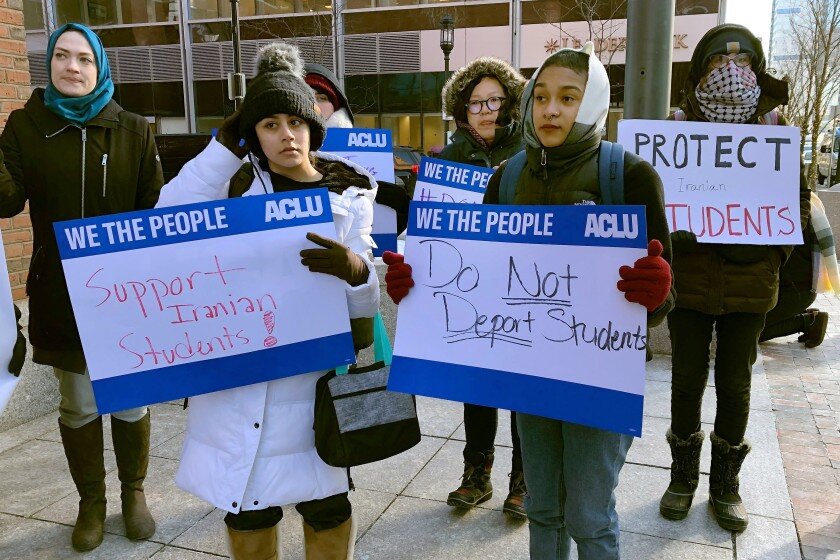Number of Iranian students turned back at U.S. airports rising: reports

TEHRAN — Reports are on the rise of American authorities detaining and deporting Iranian students at U.S. airports.
According to CNN, a 27-year-old engineer who’d planned to get a doctorate at Michigan State University was deported from Detroit Metro Airport on Monday.
A week earlier, a 24-year-old Northeastern University student was escorted onto a plane in Boston as protesters at the airport pushed for his release.
The reports come as tensions run high between the U.S. and Iran, especially after the U.S. assassination of Iran’s top anti-terror general Qassem Soleimani.
U.S. Customs and Border Protection says its inspections take additional factors into account and can uncover details that didn’t come up in previous visa screenings.
There’s no guarantee, the agency says, that someone with a visa will be allowed to enter the United States. And every day, hundreds of people are denied entry at U.S. ports.
“Something’s different now,” says Ali Rahnama, legislative counsel for the Public Affairs Alliance of Iranian Americans. “Deportation of this number of students is not normal.”
At least 17 Iranian students have been deported from the U.S. since August, according to Rahnama, who’s spoken with most of them as he tries to get a handle on what’s happening.
It’s a notable increase from previous years, Rahnama says, when one or two cases would come up annually.
“We don’t know whether this is a decision by the Boston CBP office, or whether this is a decision coming from the Trump administration, because it’s all being done in secret,” says Carol Rose, the executive director of the American Civil Liberties Union of Massachusetts.
“Maybe it’s because we have a lot of students coming, because we’re a center of higher education. Or it may well be there’s just a decision by some rogue agents here who have a personal dislike for people from Iran. We just simply don’t know.”
Protesters packed the Boston airport's arrivals lounge last week, holding signs that said, "Protect Iranian Students" and "Stop Discrimination Against Iranians."
They'd heard a Northeastern University undergraduate had been held for questioning after arriving at Logan and was on the verge of being deported. They cheered when they learned a federal judge had issued an order temporarily blocking any efforts to remove him.
But the next day, the case surged into the national spotlight. Mohammad Shahab Dehghani Hossein had been deported despite the judge's order.
Last September, Reihana Emami Arandi boarded a flight from Tehran and made her way to Boston, eager to study theology at an Ivy League university.
After nearly 100 days of vetting and background checks by the U.S. government, the 35-year-old was bound for a graduate program at Harvard Divinity School with a student visa in hand.
According to the Los Angeles Times, when she arrived at Boston Logan International Airport, she was promptly pulled aside by U.S. Customs and Border Protection officers for additional questioning.
They led her to a separate area of the airport, where an officer inquired about her travels, her work experience, her family, her studies and what her cellphone number was in Iran, she said. The officer searched her luggage, pulled out her Quran and asked what it was.
“He then asked me what Iranian people think about the explosion in Saudi Arabia,” she said, referring to the Sept. 14 drone strike on a Saudi Arabian oil facility for which the Houthi movement in Yemen claimed responsibility.
“I explained I didn’t know much and that people generally hoped the situation would get better.”
Amin, 34, landed in Georgia on January 1 with hopes of earning his Ph.D. at the University of Florida. But when he reached the airport in Atlanta, officers questioned why he had not disclosed an old school email address or one of the research papers he’d written on his visa application.
Amin, 34, began to shake and cry when he learned he had been found “inadmissible.” That’s when his “three-day nightmare” began, he said.
An officer told him he had to return to Iran on the same flight he arrived on. That flight would not be available for two days, he recalled the officer saying — and he couldn’t be held at the airport for more than 24 hours. Amin said officers put him in a holding cell for six hours before cuffing him and moving him in chains to a detention facility in Georgia.
“They are playing with people’s futures,” Amin said. “Aside from being Iranian and a student, what did I do?”
MH/PA
Leave a Comment